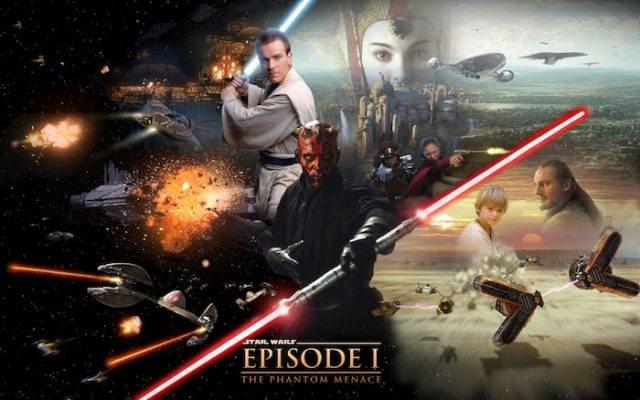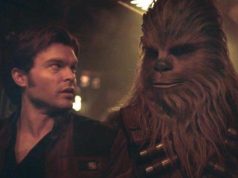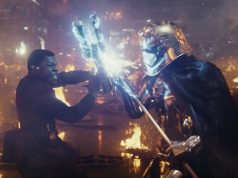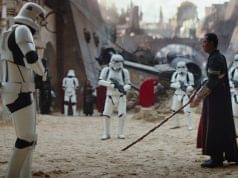
Two momentous things happened 10 years ago this week. On May 19, 1999, Star Wars: Episode I — The Phantom Menace — arguably the most highly anticipated film in the history of cinema — opened in theaters. And on the same day, I became a movie critic. I concede that one of these events probably has greater relevance to your life than the other one, but bear with me, OK?
I had written a handful of reviews before, mostly for my college paper, but it was with The Phantom Menace that I declared myself to be the official film critic for the small daily paper I was now working for. We didn’t have a movie critic, you see, and the bosses didn’t want to pay for one. On the other hand, if I wanted to see movies in my spare time and write reviews at no additional cost to the paper, well, why not? Small papers are great for that “do whatever you want” attitude. I would encourage young journalists to start at such papers, if only the industry weren’t dying altogether.
My decision coincided — and it really was a coincidence — with the release of The Phantom Menace. I vividly recall attending the screening at a theater in Salt Lake City, about half the auditorium packed with critics and hangers-on and the other half full of civilians who had won tickets from radio stations. I didn’t know the other local critics yet, but I could tell by observing them that they were as excited as anyone else. They’d all grown up with Star Wars, too, and the prequel was a major event in both their personal and professional lives.
Then there’s me: excited about the film, excited to be seeing it six days before anyone else, and a brand-new critic to boot. Though I hadn’t grown up a hardcore Star Wars fan, you’d have to be comatose not to feel the thrill of a NEW STAR WARS MOVIE!!. When the 20th Century Fox theme played, followed by the Lucasfilm logo, followed by the sudden, majestic chord that opens the Star Wars fanfare, followed by the familiar crawl of text introducing the story — well, you remember what it was like. You probably felt the same burst of adrenaline I did.
I wrote a rave review. Most other critics also gave it a thumbs-up, if not an all-out rave. Those who dared dislike it got angry e-mails from fans who refused to accept the possibility that a Star Wars film might not be very good. (This is a common occurrence now, with every new highly anticipated “geek”-centric movie, but The Phantom Menace might have been the first instance of it.) Once the film was released and broke box-office records, the backlash turned the other way. Now you had fans who HATED the film, who believed George Lucas had retroactively ruined their childhoods (I never understood how that worked), e-mailing the critics who had written positive reviews. “You fell victim to the hype!” they insisted, not thinking that perhaps they had fallen victim to unrealistic expectations, or that those critics had genuinely enjoyed the film as much as they said they did, independent of hype.
Before long, the prevailing “cool” opinion was that The Phantom Menace was a terrible movie — not just lackluster given the expectations, not a letdown compared to the original trilogy, but actually terrible. I always felt like this position was impossible to defend without taking into account external factors. Judged solely on its own merits, without looking at past Star Wars movies, without considering how long you stood in line to see it, what about The Phantom Menace is really terrible? Jar-Jar Binks, sure. Young Jake Lloyd’s acting, perhaps. But enough to reduce it to a zero-star movie? Come on.
On the other hand, while the two extreme positions — blindly insisting it’s a great movie because it has the name Star Wars attached to it, and hating it because it didn’t match what you imagined it would be — are silly, there is a certain gut-level honesty to them. If you were so fervently devoted to Star Wars that you camped out in front of the theater for a month prior to Phantom Menace‘s opening, and then the movie failed to deliver what you — fairly or not — had expected from it, then who can really argue with your assertion that you hated it? Yes, it’s true that you probably wouldn’t have hated it if you’d gone in with different expectations, or if you’d waited to see it in a less hype-filled environment. But you didn’t. You saw it the way you saw it, and that experience is a fact of history. You can’t change it. Subsequent viewings and the passage of time might change your feelings about the film, but you can’t change that first experience. It’s on the books.
In my case, the experience isn’t just recorded in my memory, but on the Internet. Like most writers, I cringe to see what I wrote 10 years ago, when I was younger and less experienced and more prone to lumpy writing. “[It] has a feeling of child-like wonder and fantasy, grounded in a strong sense of right and wrong, that makes for a fantastic cinematic experience,” I wrote. “It’s a treat for the eyes and a pick-me-up for the soul, coming in only a half-step behind its predecessors.”
After loosely describing the plot, I explained what I felt were the film’s shortcomings: Jar-Jar, the lack of a good villain (Darth Maul looks fearsome but only gets one major scene), and the general sense that characters are not as instantly likable and iconic as Han, Luke, and Leia.
Yet after spending three paragraphs on the downsides, I ended with this:
Small quibbles aside, this review could be summed up in one sentence: The Phantom Menace is a Star Wars movie. Nearly everything that was good about the Trilogy is in place here. You have light sabers, the Force (with its most spiritual overtones yet), battles in space and on land, and good guys and bad guys. Jabba the Hutt, R2D2, the Emperor (watch that guy!) — they’re all here. If you ever enjoyed a Star Wars movie, you’ll enjoy this one. It is truly a magical, wonderful flight of fancy that reminds us that ultimately, Good will overcome Evil. It’s a simple message, sure, but it’s that simplicity that makes the film work.
Then I gave it an A-, which I almost immediately realized was higher than I really felt. Something in the B area would have more accurately reflected the tone of the review.
Watching the film again now, 10 years later, only some of my feelings have changed. I wrote then that Jake Lloyd, “whose acting is fairly good for a 9-year-old (and not as bad as had been rumored), is wise beyond his years, but still child-like in his innocence.” This time, his performance stuck out as a nuisance almost on the level of Jar-Jar Binks (who, if anything, irritates me even more now than he did then). I think Lloyd’s acting is mediocre, even for a 9-year-old. The 1999 version of me apparently did not.
Overall, though, I still find the movie immensely watchable. It moves quickly, the scenes tend to be short, and the sheer imagination on display keeps things hopping even when the dialogue is unmemorable. The pod-racing sequence in the middle, with its parallels to the chariot race in Ben-Hur, is thrilling. And even with all the technological advancements we’ve seen in the ensuing decade, what Lucas did here is still pretty spectacular. “The entire movie seems to have been filmed somewhere other than on Earth,” I wrote in 1999, and I can’t think of a better way to say it now. It’s rare that a movie creates an entirely new world at all, let alone does it well.
Roger Ebert is fond of quoting the author Robert Warshow: “A man goes to the movies. The critic must be honest enough to admit he is that man.” Just because you’re a Film Critic doesn’t mean you’re immune from things like hype, buzz, expectations, and basic human emotions. You try to weed out the things that have nothing to do with a movie’s actual quality — its poster and trailers, the disposition of the audience you saw it with, etc. — but you can only do so much.
That’s why it can be enlightening to look at a movie again after some time has passed — say, 10 years, if you like round numbers and meaningless milestones. The movie has stayed the same, but the viewer (“that man,” as Warshow put it) is different. Your tastes, preferences, attitudes, and philosophies evolve over time, sometimes becoming more firm, sometimes shifting slightly, sometimes reversing altogether. Everything about you, from your personality to your life experiences, plays a part in how you perceive a movie. It’s unreasonable to think you’d feel exactly the same way, in every respect, after another decade of living has altered you.
And that, we hope, will be the fun of this occasional new column. I’ll re-examine a movie I reviewed 10 years earlier, express embarrassment over my writing, and see how my opinion of the film has changed. The point isn’t to determine whether I was “right” or “wrong” before; a review is always “right” if it accurately reflects how the critic felt when he wrote it. The point is for you and me to take a stroll down memory lane and consider how much has changed — or stayed the same — in our cultural landscape.
Star Wars: Episode I — The Phantom Menace
1999 Eric says: It has a feeling of child-like wonder and fantasy that makes for a fantastic cinematic experience, a treat for the eyes and a pick-me-up for the soul, coming in only a half-step behind its predecessors. There are familiar ideas and scenarios, but to say Lucas is merely stealing from himself would be to disregard all the imagination and sheer creativity that are apparent. The characters generally are not as immediately likable as their Star Wars counterparts were; Jar-Jar is a mistake; and there is no solid villain. Nonetheless, The Phantom Menace is every bit a Star Wars movie. Grade: A-
2009 Eric says: It doesn’t have the same zing as the original trilogy, and the characters aren’t as iconic, but what a marvelous assemblage of eye candy it is! The story is full of energy and moves quickly, and the action scenes are appropriately exciting. Who else besides George Lucas has so thoroughly created such a rich, vivid universe of people and places? Grade: B
— Film.com




